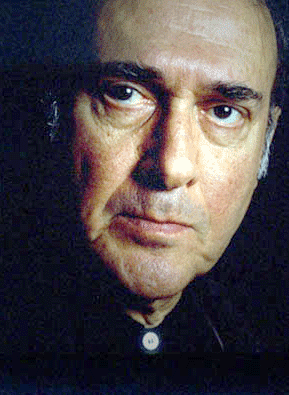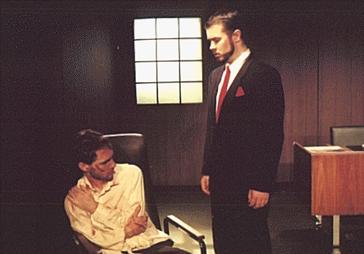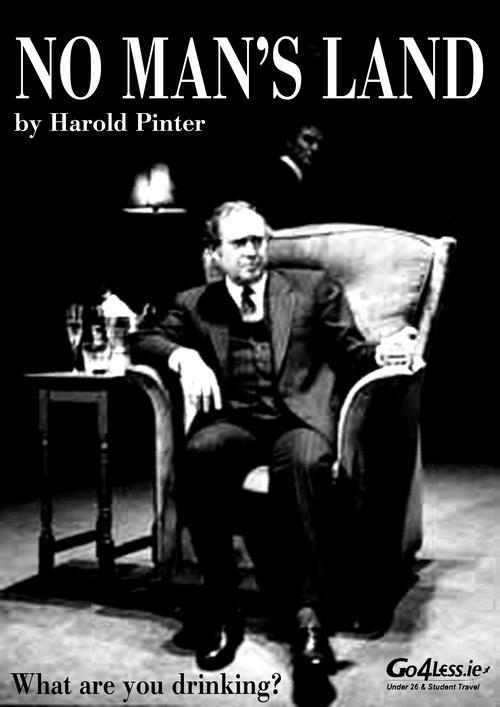October 11, 2005
The dark is in my mouth, and I suck it.. it's the only thing I have...

Watching Last Year in Marienbad last week, I was reminded of Pinter. So much of the dialogue in Marienbad functions as a kind of sorcerous incantation, a command, an attempt to issue what Deleuze-Guattari call 'order words'. There is the sense that the words do not merely describe, or describe at all, but possess an illocutionary force, a capacity to make things happen through their very utterance. As in so many of Pinter's plays, the characters - the male character referred to as 'X' in the script and the female character called 'A' (for 'Autre'?) - are fighting over the past, he by constructing it through words, she by never fully succumbing to the word-world he conjures. When X makes such statements as, 'we kept meeting each other at each turn in the path behind each bush -- at the foot of each statue -- at the rim of every pond' , our suspicion is that he is manufacturing these 'memories' as he speaks, through his speech, but part of what makes the film so haunting is that neither Robbe-Grillet's writing nor Resnais' direction confirm or deny that intuition.
Pinter's plays were always, famously, about territorial struggle, but the territory being contested was as much in time as space. (Lorenz plus Proust?) His first play, The Birthday Party, is a rendition of the relatively conventional theme of unsuccessful re-invention and of failed repression of the Past. But as his plays progress, the Past, the 'Old Times' that lend one of them its title, become more mutable, elusive, contested. The Past is not to be repressed, or hidden, but continually re-invented. It is the site of the struggle in the wintry existential comedy of his masterpiece, the claustrophobic, uncomfortably hilarious, No Man's Land in which two old men who may once have been acquaintances, even friends, or who may never have met before, attempt to cast each other as bit parts in their own continually confabulated Memories. I think - or perhaps I am misremembering - that it is Pat Cadigan who somewhere observes 'that the future is fixed, only the past can be changed.' That could be the slogan for so much of Pinter's work, in which characters stalk each other, waiting, waiting, for the moment in which they will be able to trap their antagonist into their version of the past.
These observations were partly prompted by the broadcast tonight of Pinter's 'new' play, Voices. Strictly speaking, Voices is neither new nor a play so much as a kind of 'unreliable memory' of Pinter's last five dramatic works plays (One for the Road, Mountain Language, The New World Order, Party Time and Ashes to Ashes) in the form of a sonic delirium. Voices is a collaboration with composer James Clarke, but it is much more than a matter of accompanying Pinter's words with music. Drama, in the sense of tension and/ or narrative, is in fact entirely suspended, consumed by the agitated stillness of Clarke's antarctic radiophonic score, every bit as understated and starkly beautiful as Pinter's dialogue. Clarke does not set Pinter's words to music, he draws out their already highly musical rhythms in order to treat de-contextualized phrases from the plays as sonorous components in a minimal sound-mosaic.
Like many, I found the apparent didactism of Pinter's last plays a little lacking in the enigmatic poetry that made the earlier works so compelling. Perhaps that judgement is too peremptory, and the newer plays' apparent break from his earlier methods will appear less decisive as time moves on. As a re-mixing, an auto-sampling of those later plays, Voices may play a significant role in any such re-appraisal. By subtracting context, Voices restores enigma, but in a way heightens the political impact of the words, these words about language that is forbidden, language that is forced...

'Where are you now? Do you think you are in a hospital? ... Have they raped you? How many times?' Pinter's torturer asks an unnamed woman in a section sampled from One for the Road (the last Pinter play I unequivocally enjoyed, if that is the right term for what is a deeply harrowing experience). These are of course not genuine questions, nor even interrogator's enquiries. The torture partly consists in being forced to acknowledge the torture, to bring into the symbolic order that which ought to remain unsymbolizable. She must be made to recognize that she is here, now, in an non-place that is the very opposite of a utopia, a place that is without protection, without hope, beyond the purview of any possible justice, a place where only the Night Law holds sway... What makes this all the more horrifying is the clear implication - which the torturer Nicholas takes great delight in spelling this out to his victims - that this Underworld, this Hell is not some private pervert's lair, some secret, unsanctioned Evil, but the obscene supplement of the Official Law, what it requires in order to function. 'They' know what is happening, but they will not come, as your name, your past, everything you are and everything you have been, are stripped away... For this is Hell, and nothing, nothing is more Real...
There's an interview with Pinter and Clarke in the Independent here, but, even better, if you go here, you will be able to hear Voices. I'm just listening to it for the third consecutive time. It feels like an infernal loop, a Terror I'm compelled to keep repeating...
Posted by mark at October 11, 2005 01:59 AM | TrackBack